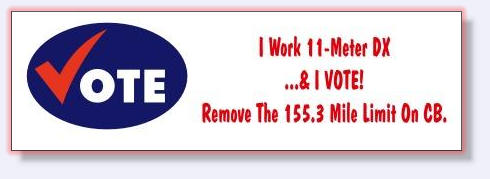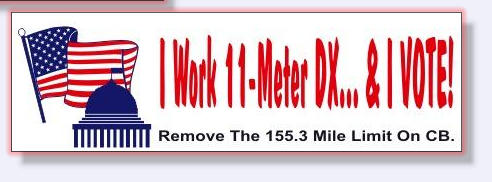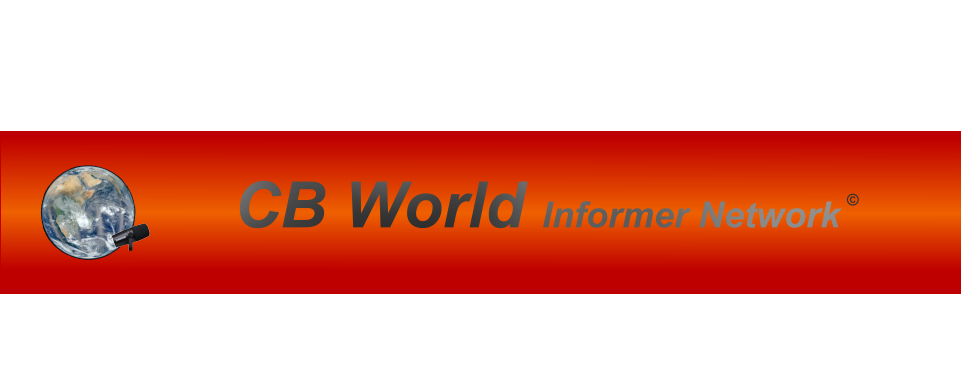A Little Background
On or about February 24, 200, Mr. Alan Dixon, N3HOE, filed a petition with the FCC to remove the 250km
(155.3 mi.) distance limit for contacts on CB radio. It received strong opposition from both the ARRL
(Amateur Radio Relay League) and the NAB. (National Association of Broadcasters) The ARRL’s
comments taken from their Minutes of the Executive Committee, Number 463 held in Irving, Texas – April 1,
2000 were as follows, “The ARRL has commented in opposition to a petition, RM-9807, by Alan Dixon
seeking the elimination of the CB rule prohibiting communication over distances greater than 250 km. The
ARRL comments note that long-distance communication is contrary to the fundamental purpose of the CB
Radio Service, and that legalizing it would encourage the use of illegal power amplifiers. Individuals who
have a serious interest in long-distance propagation have ample opportunity to pursue this interest in the
Amateur Radio Service. The FCC is expected to dismiss the petition.”
Although the argument presented above is plainly silly to many that have been active on CB, the petition
was denied by the FCC on August 18, 2000. The FCC stated, “Dixon's request is inconsistent with the
purpose of the CB Radio Service and could fundamentally alter the nature of the service.” The FCC also
said CB operators generally supported the proposal and stated that the present rule was unenforceable.
"The Amateur Radio Service is the proper forum for the desired long-distance communications sought by
the Dixon petition," the ARRL told the FCC in opposition to the petition. The FCC agreed with the ARRL and
said it did not intend to create a service paralleling the Amateur Service when it authorized the Citizens
Radio Service. "Amending the rules to permit long-distance and international communications would
undermine the purpose of the CB Radio Service rules and compromise one of the core distinctions
between the CB Radio Service and the Amateur Radio Service," the FCC concluded.
A Little Reality
Although CB was originally intended to be a short distance radio service, it has evolved into a pseudo-
hobby radio service, which supports long distance contacts. This is not a personal wish list nor is it
supposition; it’s a dose of reality. When the FCC stopped requiring licensing of CB stations and went AWOL
with respect to enforcement of Part 95, many took this as unofficial statement of “anything goes” from the
FCC. While many others and I neither condone nor encourage illegal activities on CB or 11-meter
frequencies, I certainly don’t feel that retaining an admittedly unenforceable rule discourages this activity.
Only the return of the FCC to its Part 95 enforcement responsibilities can do that. Thus, the argument that
by removing the distance limit and allowing DX communications on CB would “encourage the use of illegal
power amplifiers” is specious, at best.
The reconsideration of RM-9807 has just recently been denied as well. Mr. Dixon requested that the
verbiage be modified to exclude emergency communications. I personally believe a different approach is
needed. Put pressure on our political representatives. Ask them why a private interest group, to which I
myself belong, was able to sway the decision of the FCC over the objections of the affected constituency?
The FCC admitted knowing that “CB operators generally supported the proposal.” I understand that the ITU
treaty agreement precludes access to the high frequency spectrum without a demonstrated proficiency in
Morse code. This is why the CB service was allocated and a short-range service. However, with the
anticipated removal of the Morse requirement in 2003, the FCC didn’t even bother to discuss the possible
options. How about having a basic written Morse exam administered in conjunction with the return of
licensing to CB? Only those with endorsed licenses would be allowed to engage in DX activity, ITU issue
resolved!
Visibility
I have taken the liberty of having two styles of bumper stickers made which read ‘I Work 11-Meter DX…& I
VOTE! Remove The 155.3 Mile Limit On CB.’ The purpose here is to increase the visibility of DX activity on
CB. Let’s face it; although there are literally millions of 11-meter operators, most of our elected leadership is
unaware of the popularity of CB for SSB enthusiasts…much less the RM-9807 fiasco. The point here is
NOT to advertise the breaking of a FCC Part 95 rule; it’s to increase the awareness of politicians. Although
I display these bumper stickers proudly on my own personal vehicles, you won’t find me actively “working
DX” on 11-meters. Subsequent e-mails and/or letters to our local, state, and federal elected officials might
then take on more meaning after seeing some of these messages on the road, day after day. Who knows,
the next RM-10,xxx might then be treated with a little more consideration when a congressman/woman
asks about this “155.3 mile limit thing” before signing the next FCC budget allocation document? I’ve
provided the first one hundred free of charge, including postage, to anybody on the USENET newsgroup
rec.radio.cb who has requested one. This is my personal contribution to “the cause.” To date, I’ve sent out
just over eighty stickers, far exceeding my initial expectations. I will now require $1.50 to cover the cost of
additional examples with no profit to myself. I also encourage anyone and everyone to employ the services
of www.makestickers.com to manufacture their own stickers supporting the removal of this rule. The cost of
50 custom bumper stickers is $64.95, with the quality being excellent.


I’ve had some fellow amateur radio operators query me on why I support such a proposal. My response is
because I believe in it. I think it’s a good “training ground” for more experienced amateurs to drop in and
show them what’s possible with a mere 12 watts. I feel it’s far better to try to change or remove an unjust
rule/law using the correct protocol than simply ignoring it and continuing to violate it. It’s also a message
that the titles of CB and amateur radio operator need not be mutually exclusive. The recruiting aspect along
with the “de-criminalization” of an activity that results from a natural phenomenon truly makes this a “no-
brainer.” I hope that many of you reading these words will take a moment to send a few words in support to
your respective representatives via e-mail or “snail-mail.” If you would like a bumper sticker, just drop me
an e-mail at kc2hmn@hotmail.com and I’ll be happy to send them to you at the mailing address you
specify. Thanks for your support. Bert

© CB World Informer Network 1996 - 2023 Worldwide Rights Reserved

September
2001 Web
Edition


- August 1996
- September 1996
- October 1996
- November 1996
- December 1996
- Review Of Midland 79-290 AM/SSB Mobile
- Cobra/Uniden SSB Chassis Mod UPDATE
- Clarifiers
- President Jackson Unlocked Clarifier Mod.
- Cobra 148 & Uniden GrantXL Clarifier Mod.
- Cobra 142GTL & Uniden Washington Clarifier
- Uniden Grant Unlocked Clarifier Mod.
- Uniden PCI22 PRO SSB Clarifier Mod.
- Review Of The Northstar DX880HL
- Big Bust At The Consumer Electronics Show
- Bob's CB Has Opened
- January 1997
- The New Mongoose Model 450 Review
- Wilson Antenna Tests The Trucker 5000
- A Company With Interference Solutions
- Solving Telephone RF Interference
- Lowpass Filters: What, Where, And How
- Using Highpass Filters For TVI
- How To Conduct A Noise Audit
- Modern Do-It-Yourself Grounding Techniques
- Using Water Pipes For RF Grounding
- Using Water Pipes For RF Grounding
- February 1997
- The New Emperor TS-3010 Review
- Bulkhead Grounding
- Grounding Coaxial Cable Shields
- Using Anti-Oxidants
- Modern Lightning Protection - RF Entry Ports
- Modern Lightning Protection - AC Power Lines
- Modern Lightning Protection - Control Lines
- Modern Lightning Arrestors - Polyphaser VS I.C.E.
- Modern Lightning Arrestors - Alpha Delta VS I.C.E.
- Modern Lightning Arrestors - Cushcraft VS I.C.E.


- July 2001
- Galaxy DX 2547 Reveiw
- Inside The DX 2547
- DX 2547 Channel Mod
- DX 2547 Clarifier Mod
- DX 2547 Photos
- DX 2547 Manual Excerpts
- The Anttron Story
- Anttron 305 Revisited
- New Antrron Products
- Aries A-SWR 460 Digital Meter
- Barjan Buys Wilson Antenna
- Wilson Electronic In Cell Phone Market
- First Web Issue
- Help Get The Word Out
- August 2001
- Sneak Preview: The New Maverick A24
- Maverick A24 Front Panel Controls
- Maverick Conversion
- Inside The Magnum Maverick A24
- Barjan Buys Francis Antenna
- Wilson Antenna, 1 Year After Barjan Buyout
- CBer Busted
- Astaic's MobileMax
- Solarcon I-Max 2000
- False Performance Claims
- CAUTION: Don't Burn Out That Radio
- Magnum's Filtered Power Cord
- Dragon Super Heavy Duty SO-239 Stud
- CBWI...Give Us Your Opinion
- September 2001
- Reveiw Of The RCI 2950DX
- RCI 2950DX Image Rejection Modification
- RCI 2950DX Coversion & Clarifier Mods
- RCI 2950DX Photos
- RCI 2950DX Board Component Layout
- RCI 2950DX Adjustment Layout
- RM-9807: Petition To Remove 155 Mile Limit
- Slip-Seat Radio Box
- RF Limited UTB-1 Adjustable Talkback Board
- A Message From The Editor
- October 2001
- November 2001
- December 2001
- January 2002
- February 2002
- July 2002
- June 2014

































